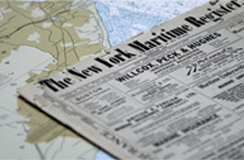Discovery In Aid of Foreign Proceedings
Introduction
One of the hallmarks of the U.S. legal system is the broad range of discovery devices that are available to civil litigants. The full range of discovery tools afforded by U.S. law is also available to foreign litigants and tribunals, provided certain statutory requirements under 28 U.S.C. § 1782 and other discretionary factors are met.
The U.S. Supreme Court's expanded interpretation of § 1782 in Intel Corp. v. Advanced Micro Devices, Inc., 542 U.S. 241 (2004), has spawned an exponential increase in the number of petitions by foreign parties seeking access to U.S. discovery tools for purposes of both litigation and private arbitration, demonstrating the broad appeal of this discovery device.
Statutory Requirements for Discovery
In order to obtain discovery under § 1782, three statutory requirements must be met and four discretionary factors must be considered by the court. The three statutory requirements are: (a) the person from whom discovery is sought must reside or be found in the district in which the petition is filed; (b) the discovery must be "for use in a proceeding in a foreign or international tribunal;" and (c) the petition must be made by a foreign or international tribunal or an "interested person."
The first requirement is essentially self-explanatory. The second requirement has raised a number of disputes. One important issue that has been addressed is whether the terms "foreign or international tribunal" include purely private arbitration. As commonly understood in the maritime industry, the term "tribunal" encompasses private arbitration. Prior to the Intel decision, however, the Second (New York) and Fifth (Houston and New Orleans) Circuits, among other courts, held that purely private arbitrations did not fall within the meaning of what constituted a "tribunal." Since Intel, the Fifth Circuit has maintained its position and the Second Circuit has thus far declined to revisit the issue.
Nevertheless, relying on Intel, several district courts have held that private arbitrations are considered "tribunals" under § 1782. For example, the following arbitrations have been found to constitute a "foreign tribunal:" (a) UNCITRAL arbitrations; (b) International Arbitral Centre of the Austrian Federal Economic Chamber in Vienna; (c) private Israeli arbitration; and (d) private London arbitration under a time charter.
The term "interested person" under the third requirement has been interpreted to include not only foreign litigants, but also persons who have a reasonable interest in obtaining judicial assistance in a foreign proceeding.
Interestingly, the foreign proceeding need not be pending in order to gain access to discovery under § 1782. It must only be within the reasonable contemplation of the foreign party at the time the discovery is sought.
Discretionary Factors for Discovery
Once the three statutory requirements of § 1782 have been met, a court is required under the dictates of the Intel decision to consider four discretionary factors before permitting discovery. These factors are: (1) whether the person or entity from which discovery is sought is a party in the foreign proceeding (such that U.S. intervention may not be necessary); (2) whether the request conceals an attempt to circumvent foreign proof-gathering restrictions or other policies of a foreign country or the U.S.; (3) whether the foreign tribunal at issue is receptive or hostile to the assistance of the U.S. court; and (4) whether the assistance sought would be unduly burdensome.
In practice, discretionary factor (1) appears to be a limited issue as the discovery is typically sought from a third-party who is not involved in the foreign proceeding. For example, § 1782 has been used to obtain evidence from a ship manager, a U.S.-based affiliated company, and even New York banks of a party.
Discretionary factor (2) has been the subject of a number of disputes. Courts have generally rejected the notion that the petitioner must meet a foreign discovery requirement prior to being entitled to assistance under § 1782. One court has summarized the position as follows:
[T]he Court in Intel made clear that an interested party does not need to demonstrate, as a threshold matter, that the discovery sought would be obtainable in the foreign jurisdiction or in any analogous United States proceeding, in order for that party to be entitled to assistance under the statute... However, a court may consider, as part of weighing the discretionary factors pertaining to the requested discovery, whether the party's request pursuant to section 1782, is an attempt to circumvent foreign proof-gathering restrictions or other policies of a foreign country or the United States.
The threshold inquiry for the court to consider under this discretionary factor therefore is not whether the discovery being sought would be obtainable in the foreign proceeding, but, rather, whether the discovery is being sought in bad faith.
Courts are also not required to consider whether the requested discovery would be admissible (as distinct from discoverable) in the foreign proceeding, and courts have discretion to order discovery that would be considered relevant to the issues in the foreign proceedings under U.S. procedural rules, even if the applicant cannot show that the discovery will be actually "used" in a hearing before the foreign tribunal.
Scope of Discovery Under § 1782
The scope of discovery permitted by § 1782 is as broad as that provided under the Federal Rules of Civil Procedure and includes both testimony from witnesses and document production. All that is required to obtain testimony is that a deponent be physically present (even if only temporarily) in the district where the Federal court is located so that service of the order can be made.
One issue that has been raised is whether the person from whom discovery is sought within the court's district can be compelled to produce documents which are physically located outside the U.S. but are still within the "possession, custody, or control" of such person. New York courts have taken the position that such extraterritorial documentary evidence is discoverable, but another court, outside of New York, has refused to do so on discretionary grounds.
More recently, a New York court has permitted discovery of financial information (i.e., the identity and location of bank accounts) of a foreign party from its New York banks, presumably in aid of seeking security from that party.
Conclusion
Judicious use of § 1782 can be a powerful strategic advantage to parties involved in, or contemplating, foreign litigation and/or arbitration. Properly utilized it can allow access to critical testimony or documents which might otherwise be unattainable.
![]()
Previous article: Is a Charterer's Interest in the Use of a Vessel Attachable Property Under Rule B? - April 2012


